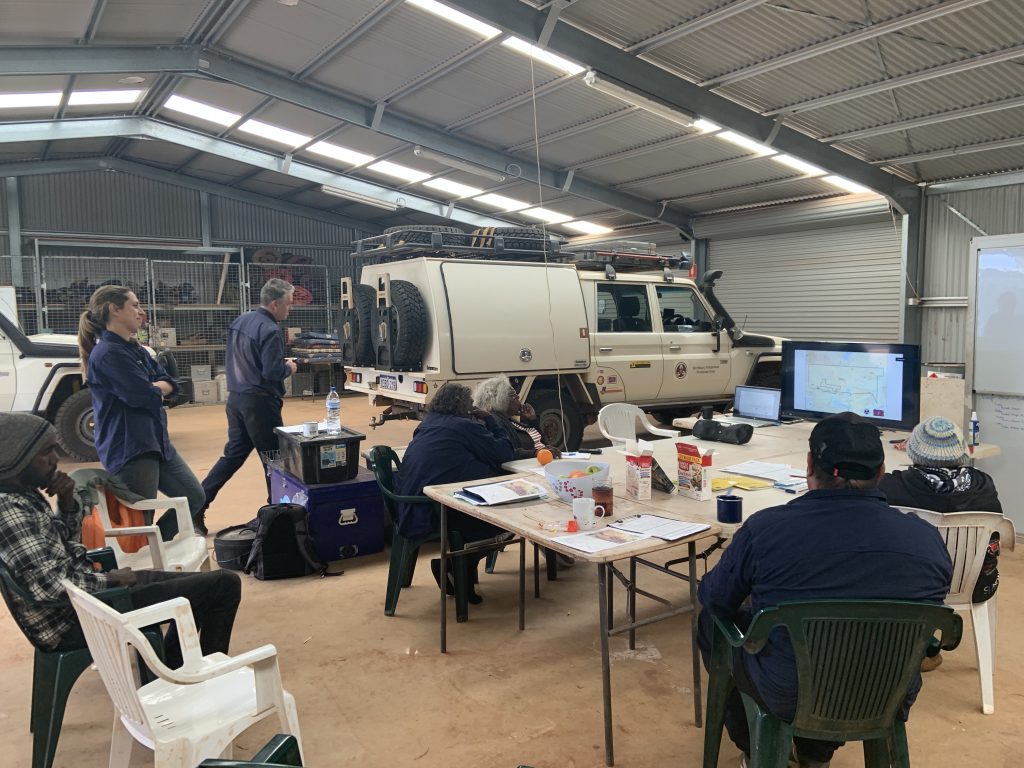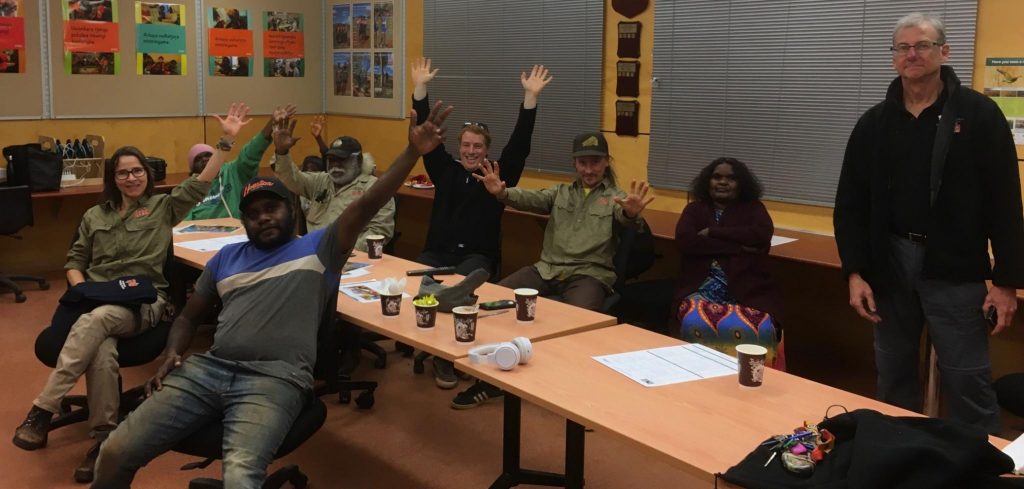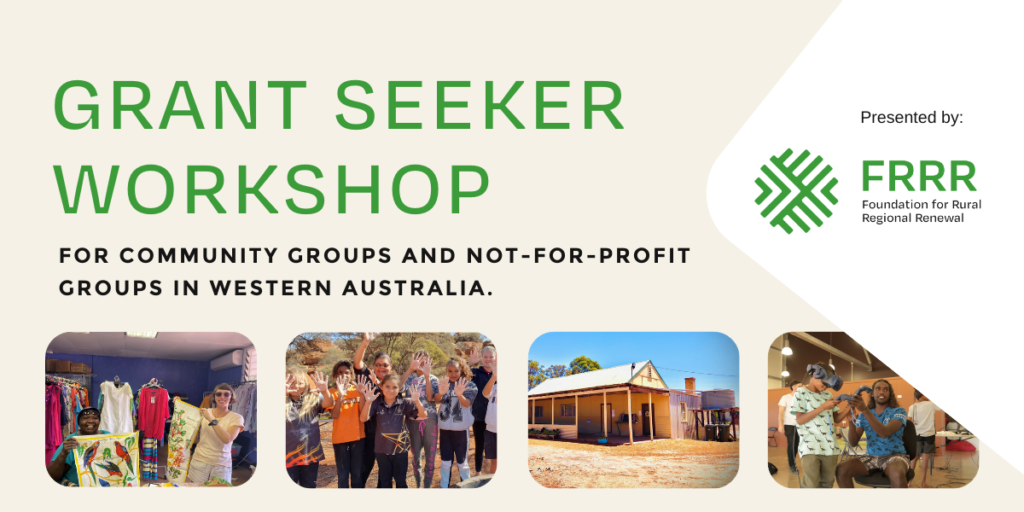Foundation for Rural & Regional Renewal (FRRR)
Ngaanyatjarra Country
Indigenous Rangers play a critical role in protecting the environment and managing country. In most places where they operate, they manage threatened species, manage the land using cool burns and fire and control feral animals – alongside developing tourism and cultural heritage activities.
The Indigenous Desert Alliance (IDA) runs an annual conference to bring together ranger groups from across the remote Southern Deserts to build Indigenous-led networks, leadership confidence and capability, increase skills relevant to Ranger groups and build advocacy for Indigenous land management. These rangers collectively manage an area approximately the size of Victoria.
The Forum is a highly regarded desert event that has been held annually since 2017, and focuses on maximising networking opportunities with an interactive program including workshops, tours, engaging conference sessions and stalls. It’s an important opportunity for Indigenous desert rangers to come together and build their alliance for personal and professional outcomes, to share their successes, challenges and opportunities, and to spend time with valued partners, stakeholders and experts.
Due to travel restrictions, the 2020 Southern Desert Rangers Forum and their Annual Conference were held online. The $25,000 grant IDA received from FRRR’s Strengthening Rural Communities program, funded by the Baxter Charitable Foundation, was originally intended to assist with the transport costs to bring five emergent remote ranger groups to Warakurna for the Forum. Instead, IDA used the funds to set up dedicated studios in Perth to run the events, with full technical support. IDA also purchased video conferencing equipment to enable the remote teams to participate in the events.
Despite meeting over Zoom, there was active participation and over 150 people in attendance over the three days the program ran, including 19 Australian Desert Ranger Groups from across the Southern Deserts, as well as rangers from the Misipawistik Cree Nations in Canada. There were presentations from Birriliburu Rangers, Rangers from APY Lands in SA, and Maralinga Tjarutja Rangers from Oak Valley.
Sessions included practical training components for rangers using GIS mapping software; co-design of education resources for weed eradication in the desert (developed in both Aboriginal language and in English); a presentation from the Threatened Species Commissioner; as well as open discussions around traditional knowledge of burning in the desert and implications for bushfires in populous coastal regions. Importantly, the highly-valued ‘Ranger to Ranger’ sessions still ran, where rangers develop and inform the priorities of the Indigenous Desert Alliance.
Emmanual Hondras, IDA Coordinator, said that there were unexpected outcomes resulting from the online delivery mode, including greater engagement between participants which he attributed to their increased comfort from being able to remain On Country.
“The IDA pivoted to ensure that our members in regional and remote Australia were still connected despite the scourge of COVID-19, providing the chance for leadership confidence and capability to grow through a new means, the opportunity for regional and remote priorities to be discussed and progressed, and the opportunity for these to be advocated to key political and bureaucratic leaders.
“Despite many people thinking it couldn’t be done, we managed to ‘keep the desert connected’ during a pandemic and during travel restrictions. It was a landmark event for Indigenous desert rangers in regional and remote communities.”
Emmanuel Hondras, IDA Coordinator
IDA used the learnings from this event to inform their Annual Conference, which was also run via video conference and attracted over 200 attendees. Thirty-one groups attended the Conference held in November – an astounding result, given that this was the first attempt at full forums / conferences via these means.
The $25,000 grant IDA received from FRRR’s Strengthening Rural Communities program, funded by the Baxter Charitable Foundation, was originally going to be used to assist with the transport costs to bring five emergent remote ranger groups to Warakurna for the forum. Instead, IDA set up dedicated studios in Perth to run the events, with full technical support. This is where the majority of total costs ended up falling, along with venue hire and catering. IDA also purchased video conferencing equipment to enable the remote teams to participate in the events.
IDA has since helped other not-for-profit organisations in the area, using their new-found knowledge and skills to assist with these organisations with their online events, which in itself is a great capacity building outcome.
FRRR acknowledges the devastating effects that Cyclone Seroja has had on a number of remote communities across Western Australia.
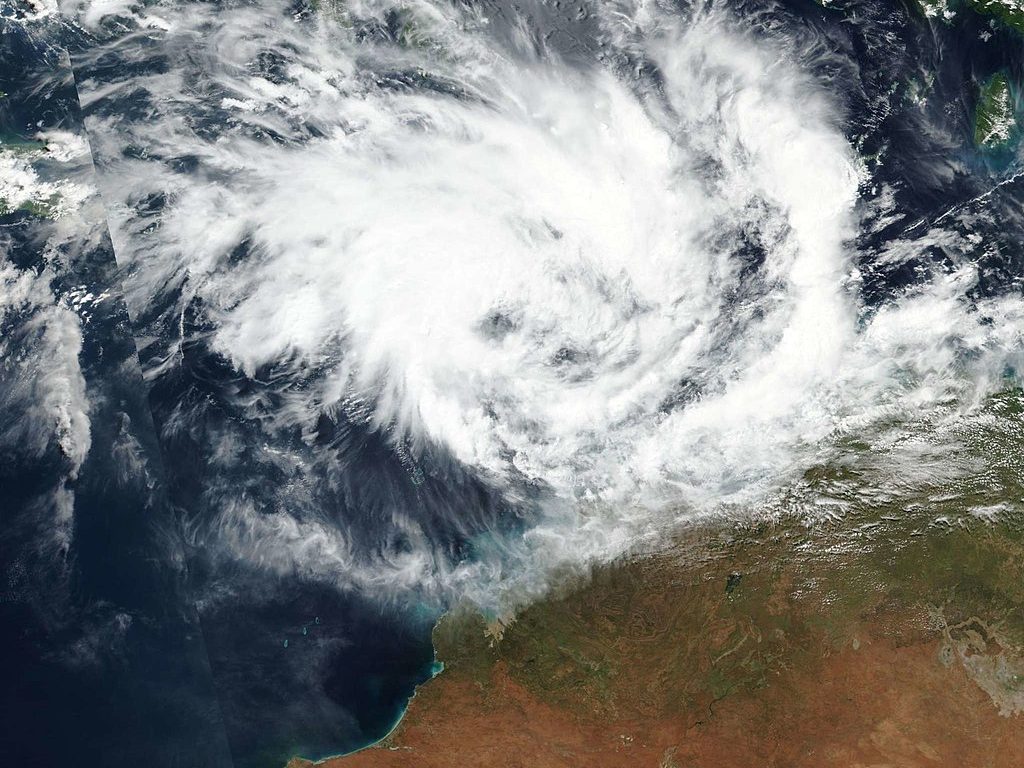
Natalie Egleton, FRRR’s CEO, said that the Foundation knows recovery for these impacted communities has only just begun, with reconnection of power an immediate priority, and the rebuilding damaged houses, farms and public assets to occur in the months and years ahead.
“We also anticipate that the activities of local community groups, which are so vital to the ongoing fabric of Western Australia’s remote, rural and regional communities, will be significantly impacted. But we also know these groups will play a vital role in supporting their community through the recovery journey.
“FRRR encourages any donors interested in assisting these affected communities to donate to charities registered with the ACNC, and to consider supporting the needs of communities through the medium-long term recovery journey, in addition to their more immediate needs,” Ms Egleton said.
FRRR has a long history of assisting communities to recover from disasters. We have facilitated support to communities recovering from the recent NSW floods; the 2019-20 Black Summer bushfires; 2019 North Queensland floods; Cyclones Debbie (2017), Oswald (2013), Yasi (2011) and Larry (2006); the 2013 Blue Mountains bushfires; the Victorian Black Saturday bushfires of 2009; and ongoing droughts; and to those places preparing for future disaster events.
“More frequent and intense climate disasters means that Australia needs to be proactive in how we fund communities to assist with their preparedness activities, and to have funds available to support them through the medium to long term aftermath of a disaster.” Ms Egleton explained.
Any funds donated to FRRR to support WA communities affected by Cyclone Seroja will be allocated through the following two key mechanisms:
- FRRR’s Strengthening Rural Communities program, which is open all year round, and assessed quarterly. Grants of up to $10,000 will be distributed; OR
- FRRR’s Disaster Resilience and Recovery Fund (DRRF). The DRRF was initiated in August 2019, in response to an increasing frequency of disasters. FRRR wanted to ensure it had a corpus of funds invested, so that it can provide some support to disaster impacted communities whether they’re large or small, in the public eye for a long time or swallowed by other events, or are well-supported philanthropically, or not. Donations made to FRRR’s DRRF are pooled and invested, making it a gift that keeps giving, with earnings drawn off every year to be distributed to communities impacted by disaster through grants in programs such as Strengthening Rural Communities. The DRRF currently holds over $4M, which is invested. FRRR will provide support to community groups recovering from the impacts of the cyclone over the coming years, by applying a portion of the earnings from this fund.
FRRR welcomes donations to either of these mechanisms. All donations over $2 are tax deductible in Australia.
Beyond FRRR, the Foundation encourages everyone to consider the impact that this cyclone has had on many individuals and communities across WA, and consider giving to a DGR-1 endorsed ACNC registered charity, which can support individuals and their communities through the recovery journey.
For more information, contact Sarah Matthee, FRRR’s General Manager, Partnerships and Services.
UPDATE: Workshop recording is available to watch below:
WA community groups and not-for-profit organisations invited
Community groups and not-for-profits across remote, rural and regional Western Australia are invited to attend a free online grantseeker workshop, hosted by the Foundation for Rural & Regional Renewal (FRRR) on Thursday 25 March, from 10:30am to 12:30pm (AWST).
The workshop will highlight FRRR’s grant programs and provide grant-writing tips to help community groups become more confident in applying for any of FRRR’s grant programs. This includes the Tackling Tough Times Together (TTTT) program for communities in drought, and the Strengthening Rural Communities (SRC) program, which is highly flexible and supports a broad range of community needs.
Recent WA communities to benefit from TTTT and SRC grants include Esperance, Leonora, Exmouth, Broome, Carnarvon, Quairading and Aldersyde. These grants funded a wide range of locally-led projects including initiatives designed to enhance community wellbeing and resilience, boost local tourism and assist in economic renewal.
FRRR connects goodwill with good purpose for the vitality of remote, rural and regional Australia. As the only national foundation specifically focused on ensuring the social and economic strength of these communities, FRRR’s grant programs give community organisations the opportunity to access funds for a broad range of initiatives that directly benefit local communities.
Register for this free online grantseeker workshop at: https://events.humanitix.com/frrr-wa-grant-seeker-workshop.
Note: Please avoid using Internet Explorer to open this link – use other web browsers such as Chrome, Safari, Firefox or Edge. If you are having difficulties opening the link please contact the TTTT team via toughtimes@frrr.org.au.
Applications for the TTTT and SRC programs are always open. The cut-off date for the next round of TTTT is 24 May 2021. The next cut-off date for SRC grant applications to be considered is 24 August 2021.
The need for the diversification of industry has been well known to the Northampton community for many years, given the heavy reliance on agriculture. Drought and unpredictable seasons have seen the withdrawal of many farming families, leaving an ageing population. Northampton has a median age of residents that is significantly older than the national average.
To address this issue, several community groups worked toward a common goal – to leverage the significant tourism potential of the town and bring in more visitors and diversify income. Northampton has a rich heritage, being one of only three towns in Western Australia to have attained the ‘Historic Town’ status. The development of an arts trail is a key feature of the plan, and the Northampton Friends of the Railway sought to add to it with the development and installation of a large 5m x 10m public sculpture.
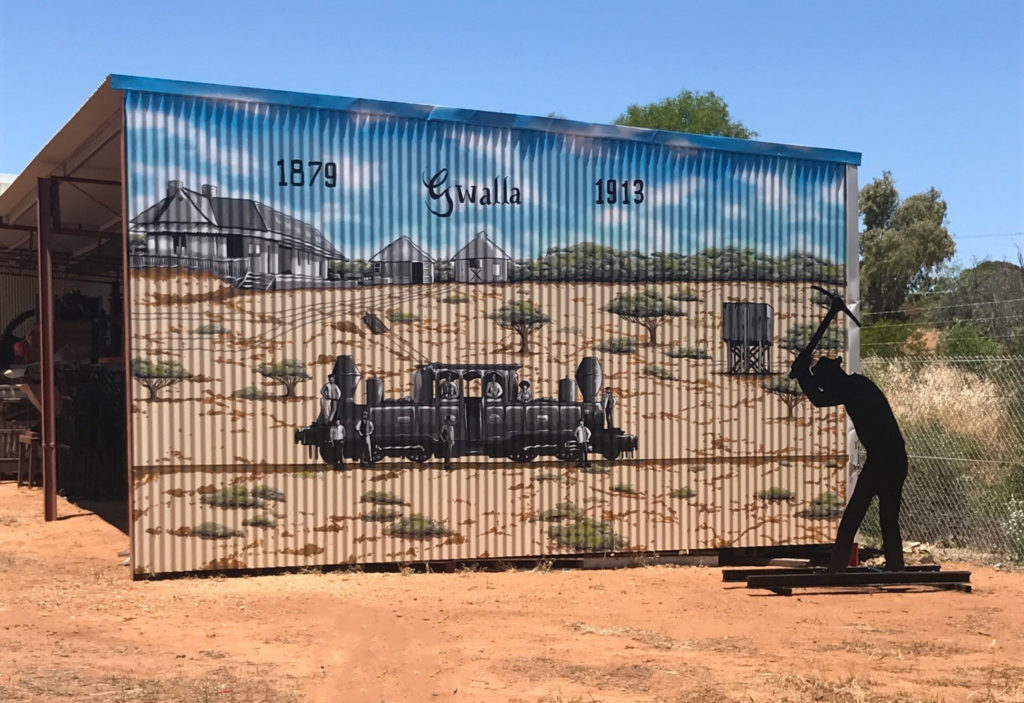
They worked with local artists and steel masons to design and construct the steal art sculpture with the $3,500 Strengthening Rural Communities grant, thanks to funding from the Bertalli Family Foundation, which was specifically used for its final design and painting. The piece depicts the historic Gwalla railway precinct with all of the original buildings of the railway station, some of which no longer exist, and is located exactly on a section of the first Government Railway in Western Australia. It’s an important interpretive piece to showcase the former area, given the significant role that the railway played in the township’s mining and agricultural history.
This project brought together economic, heritage and artistic outcomes, celebrating and promoting a unique local history.

